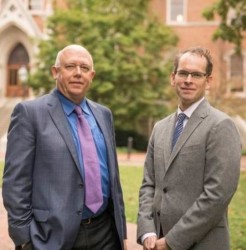[vustarinfo]

Governor-elect Bill Lee will enter office with a strong favorability rating of 57 percent, with only 22 percent of registered voters holding an unfavorable view, according to the latest Vanderbilt University Poll. The findings also suggest Lee will also find support for some of his initiatives, including expanding vocational training in the state. Meanwhile, health care has surpassed the economy and education for the first time in the poll’s history as Tennesseans’ chief priority for state government.
“Overall, we see support for an agenda that could work for our incoming governor,” said John Geer, Gertrude Conaway Vanderbilt Professor of Political Science and co-director of the Vanderbilt Poll. “Education and the economy are strong priorities, as well as immigration and infrastructure.”
“The one worry Bill Lee must deal with is health care, which has risen in importance to Tennesseans,” said poll co-director Josh Clinton, Abby and Jon Winkelried Professor of Political Science. “Although the two are related, health care now takes precedence above the economy to voters here.”
The poll of 1,004 demographically representative registered voters was conducted Nov. 19-Dec. 6, covering a variety of state and national issues. The margin of error is ±4.0 and full findings and methodology may be found at vu.edu/poll. Highlights include:
Health Care
Thirty percent of Tennesseans chose health care out of a list of issues as the state’s top priority and another 20 percent recommended it as the state’s second-highest priority.
Opioid addiction remains a serious concern; 86 percent of Tennesseans characterize it as an emergency or a major problem, while 43 percent say they personally know someone affected by it.
Medicaid expansion, a key provision of the Affordable Care Act, remains quite popular in the state, with 66 percent in favor. This puts the state legislature’s and the Governor-elect’s position against it at odds with public opinion, Geer said, noting that this is not unique to Tennessee, and that other states have let the people decide. “There were three Republican-dominated states—Idaho, Nebraska and Utah—with the same dynamic that voted via referendum for Medicaid expansion in the last election,” he said.
Though respondents indicated a variety of preferences regarding the future of the U.S. health care system, making it hard to know what exactly voters might want, there appears to be little appetite for a return to pre-ACA days: 21 percent would like to see a Republican plan replace the ACA, 32 percent want to expand the ACA and 23 percent want a Medicare-for-all-type system.
Education
Education follows close on health care’s heels in Tennesseans’ minds, with 21 percent saying it should be the state’s top priority and another 23 percent selecting it as the state’s second-highest priority.
“There’s a real opportunity here for Governor-elect Lee to advance his support for more vocational education as he enters office,” said Geer. Fifty-seven percent of Tennesseans say it’s more important for public schools to provide vocational training, while just 33 percent say preparing students for college is more important.
Of those supporting vocational education, 71 percent would support a tax increase to fund those programs, while 59 percent would support redirecting existing resources to it. “That people are prepared to support an increase in taxes to make more vocational training available underscores the importance of this issue to voters,” said Clinton.
Consistent with previous polls, 63 percent of Tennesseans say children of undocumented immigrants should be eligible for in-state tuition at state colleges and universities.
Vouchers, by contrast, remain a big question mark in Tennessee: A full 43 percent say they don’t know enough to have a clear opinion about them, while just 24 percent say they support them.
Approval and Favorability Ratings
President Trump has a 52 percent approval rating in the state, in line with previous polls. Outgoing Gov. Bill Haslam remains the most popular politician in the state, with a 61 percent approval rating, while Senators Alexander and Corker stand at 48 percent and 45 percent, respectively—also in line with previous polling.
Congress remains highly unpopular, with just 26 percent approval, while the state legislature enjoys a healthy 54 percent approval rating.
By comparison to Governor-elect Bill Lee, Senator-elect Marsha Blackburn will arrive in Washington with much less public support. Only 45 percent of Tennesseans had a favorable view of her, with 50 percent holding an unfavorable view. Geer noted that this is particularly unusual because the candidate she beat, Phil Bredesen, received a favorability rating of 55 percent, with 34 percent unfavorable—suggesting many Tennesseans voted for her despite holding more favorable views of her opponent.
“Perhaps the Kavanaugh confirmation gave many Republicans and Independents enough reason to vote for Blackburn, despite their reservations,” said Geer.
About the Vanderbilt Poll
The Vanderbilt Poll is supported by the Center for the Study of Democratic Institutions at Vanderbilt University. The statewide poll is typically conducted just before the start of each legislative session and at the end of each session, in part to determine how closely the results of the session align with voters’ expectations and priorities. CSDI also conducts a yearly Nashville poll, as well as additional special polls. In 2015, the Vanderbilt Poll became a charter member of the American Association for Public Opinion Research’s Transparency Initiative.